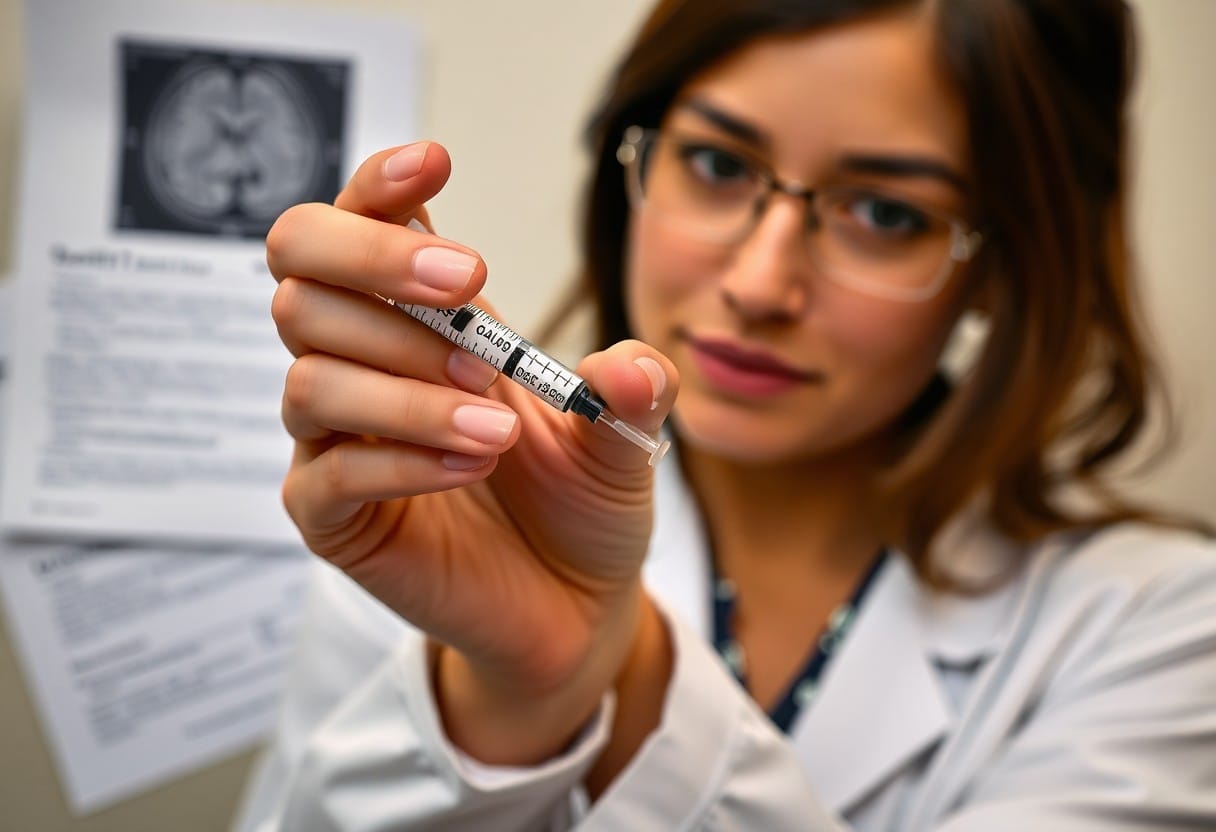Brain tumors are a serious health concern that can arise from various factors, including hormonal changes caused by medications like Depo-Provera. As you consider the impact of this contraceptive on your body, it’s necessary to understand the potential risks associated with these hormonal shifts. This informative post will explore the links between Depo-Provera use and brain tumor development, helping you make informed decisions about your reproductive health and potential side effects.
Overview of Depo-Provera
For many women seeking a reliable form of contraception, Depo-Provera is a popular choice. This injectable birth control method contains medroxyprogesterone acetate, a synthetic form of the hormone progesterone. Administered once every three months, it provides long-lasting protection against pregnancy while offering convenience and ease of use. Understanding how Depo-Provera works and its potential effects on your body is imperative in making informed decisions about your reproductive health.
Mechanism of Action
After receiving a Depo-Provera injection, your body experiences hormonal changes that primarily prevent ovulation. The progestin component thins the uterine lining and thickens cervical mucus, which makes it difficult for sperm to reach an egg. This combination of actions significantly reduces the likelihood of conception, providing effective pregnancy prevention for up to three months.
Common Uses and Benefits
By choosing Depo-Provera, you gain multiple benefits beyond contraception. This method is particularly advantageous for women who prefer not to manage daily pills or have concerns about estrogen-based contraceptives. It effectively controls menstrual cycles, often leading to lighter periods or even amenorrhea. Additionally, it can be beneficial for women with certain medical conditions like endometriosis.
Overview of the uses and benefits of Depo-Provera reveals that this contraceptive option can lead to significant lifestyle improvements. Many women appreciate its long-lasting protection and the convenience of not needing to remember daily pills. Additionally, Depo-Provera can provide menstrual cycle regulation, which can be particularly beneficial for those suffering from conditions such as endometriosis. However, as with any medication, it’s important to weigh these advantages against potential side effects and discuss any concerns with your healthcare provider.
Hormonal Changes Induced by Depo-Provera
Clearly, the use of Depo-Provera leads to significant hormonal alterations in your body. This contraceptive method primarily works by delivering a steady dose of progestin, which disrupts your normal hormonal balance. As a result, your body’s natural estrogen and progesterone levels fluctuate, leading to a variety of effects that can impact your overall health and well-being.
Effects on Estrogen and Progesterone Levels
Progesterone levels increase substantially with Depo-Provera usage, while estrogen levels may decline. This shift can create hormonal imbalances that affect various bodily functions, including your reproductive health and emotional stability. Understanding these changes can help you manage any side effects more effectively.
Potential Impact on Brain Health
Effects of hormonal changes induced by Depo-Provera may extend to your brain health. Fluctuations in hormone levels can lead to alterations in mood, memory, and cognitive function. These changes can heighten the risk of developing neurological issues, including anxiety and depression, as well as potentially contributing to tumor formation in susceptible individuals.
Consequently, it’s important to pay attention to how your body reacts to hormonal shifts from Depo-Provera. Some individuals may experience improvements in menstrual symptoms, while others could face increased anxiety or mood disorders. Staying informed about these risks, and discussing them with a healthcare provider, can empower you to make informed decisions about your contraceptive options and overall health.
Brain Tumors: Types and Risk Factors
One important aspect of understanding brain tumors is their various types and the differing risk factors associated with them. These tumors can arise from different cells in the brain and may present unique challenges depending on their characteristics. Key elements to consider include:
| Type | Description |
|---|---|
| Primary Tumors | Originate in the brain itself. |
| Metastatic Tumors | Spread from other body parts. |
| Benign Tumors | Non-cancerous; generally less aggressive. |
| Malignant Tumors | Cancerous; can grow and spread rapidly. |
| Gliomas | Develop from glial cells; common type. |
Recognizing the types of brain tumors is important for proper diagnosis and treatment options.
Types of Brain Tumors
Brain tumors can be classified into several categories, each characterized by distinct cellular origins and properties. Understanding these types will aid you in recognizing symptoms and seeking timely medical advice. Notable types include:
| Type | Characteristics |
|---|---|
| Astrocytomas | Formed from astrocytes; can be aggressive. |
| Oligodendrogliomas | Arise from oligodendrocytes; often slower growing. |
| Meningiomas | Originate in the protective layers of the brain. |
| Medulloblastomas | Common in children; can spread quickly. |
| Pituitary Adenomas | Non-cancerous; affects hormone levels. |
Perceiving the various types helps in early detection and management of brain tumors.
Known Risk Factors for Brain Tumors
Between genetic predispositions and environmental exposures, many factors may increase the likelihood of developing brain tumors. Some of the known risk factors include:
| Factor | Description |
|---|---|
| Family History | Genetic links can heighten risk. |
| Age | Certain tumors are more prevalent in specific age groups. |
| Radiation Exposure | Prior exposure can increase brain tumor risk. |
| Immune System Disorders | Conditions that weaken immunity increase risks. |
| Chemical Exposure | Exposure to specific chemicals may be harmful. |
The recognition of these risk factors can lead to better awareness and preventative measures.
Even as you navigate your understanding of brain tumor risk factors, keep in mind that individual cases may vary significantly. Staying informed about your medical history, environmental risks, and following your physician’s advice can help you manage potential risks effectively. The power lies in your awareness and proactive approaches to health.
Research Studies on Depo-Provera and Brain Tumors
After examining the available research, the relationship between Depo-Provera and brain tumors remains a topic of ongoing inquiry. While some studies suggest a potential association, the evidence is not yet definitive. Understanding this relationship can help you make informed choices regarding your reproductive health.
Epidemiological Studies
An analysis of epidemiological studies indicates that there are varying results concerning the use of Depo-Provera and the risk of developing brain tumors. While some research highlights a possible link, others find no significant correlation, emphasizing the need for more comprehensive investigations.
Case Reports and Clinical Trials
After reviewing case reports and clinical trials, you may find that incidences of brain tumors among Depo-Provera users have been documented, although these cases are rare.
But it’s important to note that the occurrence of brain tumors in women using Depo-Provera is still extremely uncommon. Most clinical trials and case reports indicate that while there have been isolated incidents, the data does not strongly support a direct causative link. Awareness of your personal health history and bias in interpreting these reports can equip you to make better decisions about your options. Always consult with your healthcare provider to discuss any concerns and tailor the best plan for your individual health needs.
Analyzing the Risks
Not all studies point to a clear connection between Depo-Provera and brain tumors. It is important to consider the wide range of individual factors that could influence your risk level, which may vary from person to person. Understanding potential risks is vital in making informed decisions about your health and contraceptive choices.
Evaluating the Evidence
On examining the available research, it becomes clear that while some studies suggest a possible link between hormonal contraceptives like Depo-Provera and certain types of tumors, the evidence remains inconclusive. It’s important for you to weigh these findings against broader health data and your own medical history.
Risks vs. Benefits of Depo-Provera
Risks associated with Depo-Provera include potential hormonal side effects and concerns about long-term health implications. However, the benefits often include effective pregnancy prevention and ease of use, making it a popular choice among many. Weighing these factors carefully is important for informed decision-making.
Indeed, when considering Depo-Provera, you should recognize that the benefits, such as the convenience of not needing to remember daily pills and a reduced risk of certain cancers, can be significant. However, you must also take into account the risks, including potential links to brain tumors, weight gain, and bone density loss. It is vital to consult with your healthcare provider to evaluate your unique circumstances, weighing the positive aspects against the possible dangers to make the best choice for your health.

Expert Opinions and Recommendations
Despite ongoing research, the relationship between Depo-Provera and brain tumors remains complex and not fully understood. Medical experts recommend that you engage in open discussions with your healthcare provider to evaluate your individual risk factors and treatment options. Staying informed and proactive about your reproductive health can help you make decisions tailored to your needs.
Insights from Medical Professionals
After consulting with various specialists, it is clear that the consensus leans towards the necessity of individualized patient assessments. While some studies indicate a potential risk, experts emphasize that other factors—such as family history and lifestyle choices—play a significant role in your overall risk for brain tumors.
Guidelines for Patients
Below are some important guidelines to help you navigate your concerns related to Depo-Provera and potential health risks. Your healthcare provider should always be your first point of contact for personalized guidance.
To ensure you make informed decisions about your health, it’s advisable to discuss any concerns related to Depo-Provera with your healthcare provider. You should also review your family medical history to understand any potential risk factors. Regular check-ups and screenings can help identify changes early, and keeping an open line of communication with your provider is key to adjusting your contraceptive choices as necessary. Understanding both the benefits and potential risks of your contraceptive methods can empower you in maintaining your overall health.
Conclusion
From above, you should be aware that while Depo-Provera offers effective contraception, it may be linked to hormonal changes that have raised concerns about potential risks, including brain tumors. Understanding these risks can help you make informed decisions regarding your reproductive health. It’s vital to consult with your healthcare provider to weigh the benefits and risks of Depo-Provera in your specific situation. Staying informed empowers you to take control of your health and make choices that align with your well-being.

















